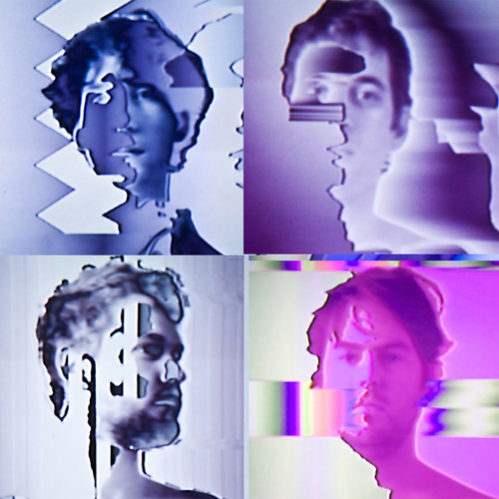Interview: Liam O’Neill of Suuns

This past weekend Montreal electro-infused, psych-rock band Suuns (Secretly Canadian) played at Black Sheep Inn for the first time and treated us to their in-your-face sound. Their pulsating, unfettered sound was unforgettably penetrating to us in the quaint venue, and nothing was going to stop the music from making an impact on those who made it out that night. Joe wrote a great post on the night, which can be found here.
Before any of this went down, I had the opportunity to sit down and chat with Liam O’Neilll, drummer of Suuns. We met somewhat awkwardly in the washroom, where I made it clear that it was not my intention to interview a member of one of my favourite Canadian bands next to a pisser. So we sat down near the merch table and got comfortable.

Interview with Liam of Suuns
Matias: You guys spoke to Rachel from CKCU Debaser radio show earlier this week and noted that you get kind of tired answering questions about your band name. Can you talk about the most awkward interview moment you have ever experienced?
Liam: Oh yeah, it happens all the time. One in particular was a European interview we did in Amsterdam. The woman interviewing us was a well-reputed journalist, and a big deal apparently. The interview was going on for 10 minutes or so and the questions were pretty weird. They didn’t seem entirely appropriate for some reason. It became pretty obvious that she thought we were Sunn O))), which is a completely different band. I mostly just felt bad for her, it was super embarrassing. We had to tell her that we weren’t that band, and she knew nothing about Suuns since she did all her research on Sunn O))). That’s pretty bad journalism.
M: What’s your favourite spot you’ve hit on tour so far?
L: We do the majority of our touring in Europe because that’s where most of our fans are. Going there is a trip for us. Specifically playing in Paris, it always seems to be crazy there. It may not be the best gig for us, but it’s certainly the most novel experience. One of our first ever European gigs was in Paris and we didn’t expect anyone to show up, and then it ended up being a great show.
M: How do you find the fans over there? Is the reception much different than it is here?
L: Yeah, it is a lot different. The level of success we’ve had over there in Europe is higher, so the shows over there feel a little more hyped. I often feel like our North American dates are a lot more work, it’s just a little bit harder. In Europe there’s more deluxe treatment. I think the ‘kitsch’ factor is higher there, that there’s something special about a Canadian band going over there and playing. And for good reason I think, because when it comes to playing music like we do – that psych-rock kind of stuff – that doesn’t really exist very much over there. There’s a huge market for it, but none of those European countries churn out music of quality when it comes to the sound we’re going for. To North Americans, maybe rock bands are kind of boring but over there it’s certainly sought after.
M: Is maintaining a unique sound something that’s really important to the band as you go forward?
L: Absolutely. That’s the only thing we have going for us. There’s some different ways to approach music, and a popular way of going about it is just having a standard sound and playing that really well. I think that we make a lot of our aesthetic decisions evasively. If something sounds too much in one style or the other, there’s a pretty rigorous process in deciding what works. Sometimes we’ll come up with a really cool sounding song or part and never use it, in the interest in carving out our unique philosophy behind our music. It’s the alchemy of making a billion decisions together, it keeps on working for us.
I remember when we were writing Images du Futur and we were really worried that it would sound nothing like the first album. We had so much time to write those songs and let things steep, but it was nice to realize that we still sounded like us. It’s just the sound of us working hard and regularly, it’s the sum of our intellects.
M: I’m sure you’ve gotten a lot of feedback from your video for ‘2020.’ What’s your perception of music videos in this day and age?
L: I remember watching MuchMusic after school, and in that era popular music became popular because of the video more than anything else. If you had good songs it was almost just a bonus back then. Your MuchMusic and MTV presence were much more important to you as a band in those days. I think that approach has been normalized and is more of a capitalist process now. It’s almost a must to make a music video now and making a living in the music business. It’s a way for your music to be more easily absorbed into the machine. It’s how a lot of bands and songs get disseminated.
It’s a little bit troubling because it’s not even up to the musician anymore it seems. You spend so much time putting love and effort into a song, and then the video is often an afterthought. Often your label says, “It’s time to make a video for this song,” so you do. I find these days music videos are just tacked on, and the scene surrounding that somewhat devalues it. It’s pretty rare that I see a video that’s memorable or that adds anything to the song.
M: Was it important for you guys to make a video that stood out with regard to the visual intensity and aesthetic? Was it an afterthought?
L: To be honest, it was sort of an afterthought. I wouldn’t exempt ourselves from all the musicians we were just talking about. I think the way we interact with the label, how we want to make music, how they want to market us – it’s all very much in that production machine approach in the industry. So you’re working within that framework, and the best way we can think of doing it is doing it in our own aesthetic universe. We have been working with Sabrina Ratté, who directed the ‘2020’ video, for about a year prior to its release. We really thought that what she did spoke to what our aesthetic was. So I think the philosophy of the approach was that we were going to make a video for a single so let’s do it in a way that works for us. I think that there’s such a saturation of music in the popular market today, I think that a video is a “calling card” to reconcile your band’s aesthetic with the Internet at large. The person watching can sort of understand what the band is all about through watching a music video. I don’t know if I endorse that, but that’s the way it is.
M: Your song ‘2020’ was featured in the movie Only God Forgives, which is quite possibly the most insane movie I’ve ever seen. Was it a big deal for you guys to get that call?
L: To be honest I haven’t seen the movie yet. It got a lot of bad reviews, but I think a lot of times reviews aren’t a good indication of what to watch. I watched Spring Breakers last week and it got terrible reviews but it was one of the coolest movies I’ve ever seen. When you’re in the publishing world, these high-flown offers happen all the time. I got the email and I didn’t feel opposed to them using it. I didn’t think we’d ever get it, and I had never heard of the director. I had no idea about the project, so to see it come out and have a good reception in the movie was a pleasant surprise for us.
http://vimeo.com/69738595
